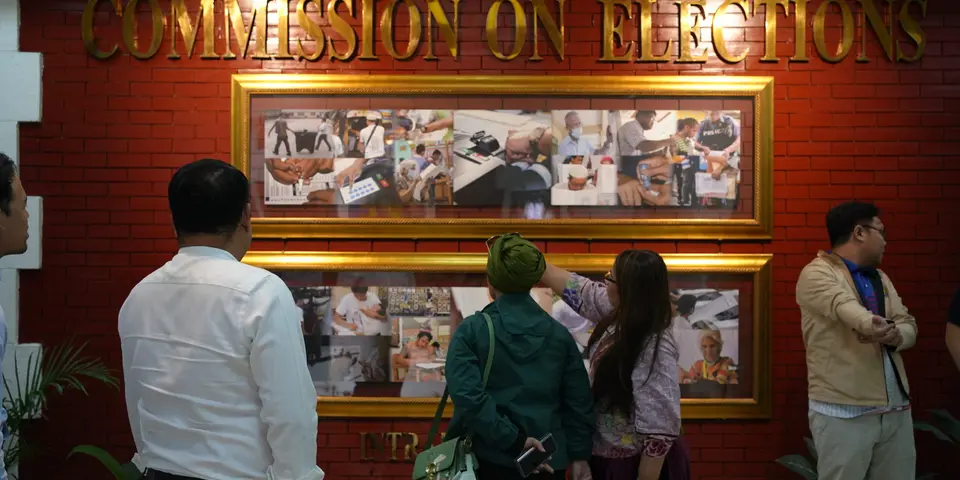
Machine Failures, Dynasties, Harassment and No Secret Ballot: Southeast Asian MPs Question 2025 Philippine Midterms Integrity
May 15, 2025

MANILA, 15 May 2025 —ASEAN Parliamentarians for Human Rights (APHR) extends its congratulations to the people of the Philippines for their active participation in the 12 May 2025 midterm elections. With a reported voter turnout of 80.27 per cent, the election reflects a continued commitment to democratic engagement—closely matching the historic 83 per cent turnout recorded during the 2022 presidential elections, the highest in the country’s automated election history.
APHR commends the Commission on Elections’ (COMELEC) commitment to transparency and its proactive engagement of poll workers and accredited electoral watchdogs to empower Filipino voters on the use of the new technology. The vote counting machines (VCMs) aim to bolster election integrity by featuring a larger screen that displays scanned ballots for voter verification; built-in boxes for secure storage of printed ballot receipts; and the random manual counting to ensure additional accountability.
However, challenges—including barriers to full inclusion of persons with disabilities, disinformation, and lack of transparency and public consultation on the technology procurement process—persist and demand urgent, sustained institutional reforms.
During its four-day Election Study Visit, the APHR delegation of policymakers from Indonesia and Thailand uncovered alarming red flags in the credibility of the 2025 Philippine Midterm Elections as it conducted its consultations and election day observations in select precincts in Quezon City.
Among the most critical issues identified were last-minute software updates to the vote counting machines (VCMs), discrepancies in reported vote totals—including undercounting and overcounting—and a lack of accessible mechanisms for voters to lodge complaints or seek redress at polling precincts.
“It is dismaying to learn that these are not mere technical glitches but signs of systemic neglect that effectively disenfranchise thousands of Filipino voters,” said Mercy Chriesty Barends, APHR Chair and the Member of the House of Representatives of Indonesia.
The citizen electoral watchdog Kontra Daya reported a mismatch in the hash codes used during the public audit of vote-counting machines compared to those on election day—raising serious concerns about the integrity and transparency of the automated election system. While COMELEC and the Parish Pastoral Council for Responsible Voting (PPCRV) claimed that spare VCMs were available and within reach, election-day observations revealed otherwise, with several precincts experiencing delays and unresolved technical issues.
In many precincts, ballot secrecy was poorly enforced. Delegates noted that voters were given only small folder covers that did not ensure privacy while filling out their ballots. In some locations, such as Robinsons Magnolia, voters’ personal information and photographs were openly displayed, challenging not only the principle of secret voting, but also, potentially, the safety and security of voters.
“Polling stations we visited offered little protection for secret voting. This not only compromised the integrity of the ballot but may also endanger voters, particularly those supporting progressive or opposition candidates,” Barends added.
Furthermore, there are no serial numbers on ballots, which impedes any meaningful verification of unique votes in case of disputes. Former Member of Parliament from Indonesia, Luluk Nur Hamidah remarked, “the absence of serialized ballots opens a dangerous gap for potential manipulation. It’s a basic accountability measure that is glaringly missing.”
A voter from Kamuning reportedly received a ballot receipt indicating an overvote for the congressional position. When this was reported, local election officials admitted the challenge of verifying it—again due to the lack of traceability.
The delegation also documented troubling reports of vote-buying, with sums allegedly reaching as high as PHP 16,000 (USD 286) per vote. This practice, alarmingly normalized, was highlighted during consultations with academic experts and civil society groups. Discussions with the Center for People Empowerment in Governance (CenPEG) further confirmed the enduring influence of entrenched political dynasties and religious voting blocs. Over 70% of legislators in the Philippines hail from political families, with certain provinces effectively monopolized by a few clans—undermining fair competition and representative governance.
Election-related violence and red-tagging also marred the run-up to the polls. According to Bulatlat, an independent newsroom, the killing of veteran journalist Juan “Johnny” Dayang in Aklan on 29 April— days before the election—marked the sixth journalist murdered since President Marcos Jr. assumed office in 2022. This deepens the climate of fear and reinforces the shrinking space for independent election coverage and critical voices.
Thitikan Thitipruethikul, a Member of Parliament from Thailand, emphasized, “the convergence of machine malfunctions, lack of safeguards, red-tagging of progressive candidates, and misuse of the party-list system paints a deeply concerning picture. Together, these issues erode public trust and further marginalize underrepresented sectors of Philippine society.”
As the election study visit concludes, APHR urges COMELEC to act swiftly and decisively to investigate these issues and implement immediate reforms to restore public confidence in the electoral system. “We call on COMELEC and Philippine authorities to address these anomalies with urgency, ensure greater transparency and accountability, and deliver the credible and democratic elections that Filipino voters deserve,” Thitipruethikul said.
For queries and interview requests, contact: [email protected]
ASEAN Parliamentarians for Human Rights (APHR) was founded in June 2013 with the objective of promoting democracy and human rights across Southeast Asia. Our founding members include many of the region's most progressive Members of Parliament (MPs), with a proven track record of human rights advocacy work.